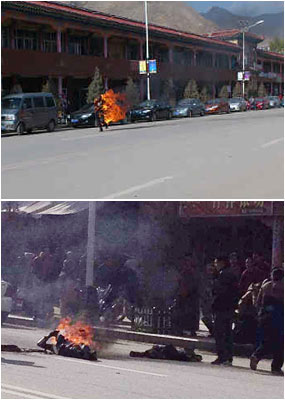- A Tibetan farmer in his late fifties called Dorje Rinchen (pictured) set fire to himself today in Labrang and has died.
- Dorje Rinchen’s self-immolation follows that of a Tibetan man Dhondup, in his sixties, near the entrance of Labrang monastery yesterday. Dhondup had said before he died that he felt if Tibetans needed to self-immolate, it should be the older generation who should do so, not young Tibetans.
- Today’s self-immolation raises the number of self-immolations by Tibetans inside Tibet to 58 since February 2009.
 Dorje Rinchen, who was a farmer in his late fifties.  Dorje Rinchen ablaze after he set fire to himself today (October 23) and later collapses to the ground in Labrang. |
Dorje Rinchen set fire to himself at around 3:30 pm on October 23 near the military camp and in front of the Gyugya market on the main street of Labrang (Chinese: Xiahe) in Kanlho (Gannan) Tibetan Autonomous Prefecture in Gansu Province (the Tibetan area of Amdo). According to Tibetans in exile, Dorje Rinchen did not die immediately but has now passed away. The same sources said that local people did not allow his body to be taken away by troops. Instead his body was taken home to his village, Sayi, which is around two kilometers east of Labrang monastery. Monks from Labrang were initially not allowed to go to his home to pray.
Dorje Rinchen leaves a wife, son and daughter. He used to sell bread at the monastery.
A report in the Chinese state media confirmed the self-immolation, saying that the man was identified as a 58-year old villager from Jiujia township (Xinhua, October 23, 2012).
Dorje Rinchen’s self-immolation was the second at Labrang in two days. Yesterday, Dhondup, a layperson in his late sixties, set fire to himself and died near the entrance of Labrang monastery. According to Tibetans in exile, police and officials took Dhondup’s remains away after he had set fire to himself. But they then gave his body back to the family, apparently because they feared Tibetans would protest if they did not, and the family brought his body back to their home. Tibetans traditionally keep dead bodies at home for some days to carry out prayers for their passing and for an auspicious rebirth.
Before his death, Dhondup had often talked to young people, and expressed the view that if Tibetans need to self-immolate, then it should be the older generation who does so, not the young. A Tibetan who is from Labrang and is now living in exile said: “He used to say that we had a very difficult life under the Chinese authorities, saying that the Chinese torture us and look down on us. He said to young people that their lives were really important to Tibet’s future.”

